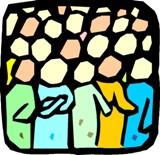Home | About Us | Directions | Bulletins | Sermons & Audio | Cross Of Christ Studies | Classes | Student and Parent Resource Page | Dangers Facing the "Non-Traditional"
Click Here for the Latest Edition of the Auburn Beacon
Building
a Biblical Faith
Wednesday Evening
College
Bible Class
Download the current outlines:
Lesson 1 -
Make Your Faith Sure
Lesson 2 - Protect and Nourish Your Faith
Lesson 3 - Choose To Let Faith Control Your Emotions
Planning to Visit Us?
What
to Expect
Current Class
Information
Thoughts To Ponder
A failure is
not someone who has tried and failed;
it is someone who has given up trying and
resigned himself to failure; it is not a condition, but an attitude.
You will need
the following viewers
to view many of the
files on this site.
![]()
Click here to
download
Adobe Acrobat Reader
![]()
Click here to
download
Microsoft PowerPoint Viewer
A Study of
the local Church
College Bible Class
by
Larry Rouse
Download the outlines:
Lesson1 - Attitudes Towards Open Study and Resolving
Differences
Lesson 2 - The Need to Find Bible Authority
Lesson 3 - The Local Church and the Individual Christian
Lesson
4 - The Work of a Local Church
Lesson 5 -
The Organization of a Local Church
Lesson 6 -
The Fellowship of a Christian
Click Here for Audio and Other Files
University church of Christ
Assembly Times
Sunday
Bible Classes (9:30)
AM Worship (10:20)
PM Worship (6:00 pm)
Wednesday
Bible
Classes
(7:00 PM)
Location
449 North Gay Street
Auburn, AL 36830
Click Here for Specific
Directions
Three Costs of Influence and Leadership
by Clay Gentry
There are people in this world who possess the natural ability to lead and command the respect of others. Whether you call it charm, charisma, magnetism, or whatever, such people wield a powerful influence on those who look up to them as the embodiment of all they would like to become themselves.
Peter apparently possessed such qualities and was a leader among the apostles. It was Peter who always listed first when the apostles are named in scripture (Matthew 10:2; Mark 3:16; Luke 6:14; Acts 1:13). It was Peter who declared Jesus as the Christ (Matthew 16:16). It was Peter who took the lead in seeing the need to replace Judas (Acts 1:15-26). It was Peter who stood up and raised his voice above and proclaimed Jesus as the Christ on the Day of Pentecost (Acts 2:14).
We have all known and have been influenced by people like Peter. Every one of us has our “hero” that we have looked up to through the years. Perhaps it was a parent that was your hero, or an uncle/aunt, or grandparent. Perhaps it was a helpful teacher or an encouraging coach. Perhaps it was a preacher, or pastor, or a silver-haired saint.
The opportunities for good that leaders and hero’s possess are tremendous; but so are the responsibilities. The confidence of others is a trust that must be carefully protected. On one hand a leader can influence someone to achieve greater heights; while on the other the sinful actions of a leader can lead their admirers to the lowest of lows.
Such was the case with the apostle Peter and his refusal to eat with the Gentile Christians at Antioch (Galatians 2:11-21). Peter had come down to Antioch and was socializing and eating with the Gentile Christians in the church there. But when certain Christians came from James in Jerusalem, Peter was afraid of what they might say about him eating with Gentiles (see Acts 10:28; 11:2-3 for an explanation of Jewish thoughts on eating with Gentiles) so he separated himself from the Gentile Christians and wouldn’t eat with them. Peter’s hypocritical actions lead the rest of the Jews in the church at Antioch, including Barnabas, to stop eating and having fellowship with their Gentile brethren. When Paul saw Peter’s actions he rebuked him to his face in front of those who were led astray by his actions.
There are three lessons we, as leaders, can learn from this incident that will help us maintain our influence with those who look up to us:
Leaders must live more cautiously than others. Every Christian is warned not to place a stumbling block in his brother’s way (Romans 14:13; 1 Corinthians 8:9) but leaders are to live even more cautiously than others because of their influence. While it may not have mattered much for one Jew to not have eaten with Gentiles it mattered when Peter did not eat with them. Peter failed to live more cautiously than others. He failed to realize that others would follow his lead and sin by “playing the hypocrite.”
As leaders, whether as parents, or preachers, or professionals, we must live more cautiously than others. People (our children, our congregations, our friends) are looking up to us as leaders for guidance in what to do, for permission to do it, and for the encouragement to keep it up. Many times the guidance, permission and encouragement they are seeking comes not from our words, but from our actions. Since our actions speak as loudly as our words, we need to exercise caution in the way we live our lives. Cautious living is simply a cost – an inevitable cost – of influence and leadership.
Leaders must weigh the impact of their decisions. Leaders must be prepared that their decisions will have a greater impact on others than the actions of those with lesser influence. While Peter was probably not the first Jewish Christian to not eat with Gentiles the actions of the less influential had gone unnoticed by the majority. It was inevitable that Peter’s sin would result in greater impact by all the Jews in the church at Antioch, including Barnabas, refused to eat with their Gentile brethren (Galatians 3:13).
As leaders we must carefully weigh the decisions that we make, because our decisions impact the lives of others. We must weigh the impact of the words we say, the purchases we make, the relationships we keep, the jobs we take, the hobbies we have, the places we live, the church we attend, and the list goes on and on. And while it may seem overwhelming, having to weigh the impact of our decisions is simply a cost – an inevitable cost – of influence and leadership.
Leaders must endure sterner rebukes. Paul said that he withstood Peter “to his face… before everyone.” (cf. Galatians 2:11, 14) Paul recognized that Peter’s actions required an immediate and stern rebuke in front of those whom he led astray and those whom he hurt by his sin. Peter could not have the luxury of a private meeting with Paul; Peter had betrayed a trust. Nothing less than an open rebuke could counteract the harm that had resulted from his sinful action.
As leaders we must endure sterner rebukes when we do wrong. It’s inevitable that when we have not lived cautiously, nor weighed the impact of our decisions we will led others astray by our actions. The temptation is to demand our right for a matter to be treated fairly (which means privately) but it is only fair that as public leaders we receive stern, public rebukes for our errors. Sterner rebukes are simply a cost – an inevitable cost – of influence and leadership.
When “Shoeless” Joe Jackson was involved in the Black Sox Scandal of the 1919 and was on his way to trial, a small boy, hurt, disappointed, with tears in his eyes, was heard to cry, “Say it ain’t so, Joe, say it ain’t so.” Each of us is likely someone’s hero and a looked up to leader. Let us, when we are presented with temptation, look ahead to the potential tears, and hurt and disillusionment that we could bring upon those who look up to us; let the cries of, “say it ain’t so…” ring in our ears and motivate us to live cautiously, weighing the impact of our decisions, and accept a sterner rebuke for our errors.
This article has been adapted from Bill Hall’s article entitled, The Cost of Influence and Reputation from his book Two Men… Articles on Practical Christian Living published by Gary Fisher, 1998.
Other Articles
Are You a Heretic?
Are They/We Christians?
Count Your Many Blessings and Then Weigh Them
![]() Would you like
others to read this article?
Would you like
others to read this article?




